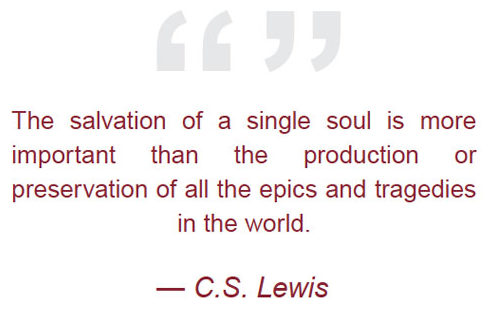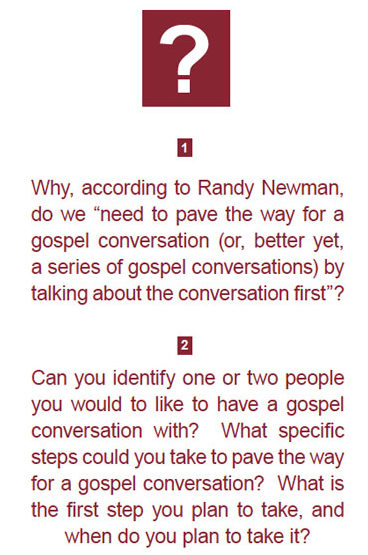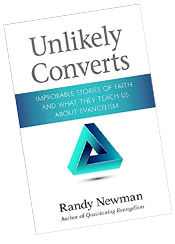Back to series


Recommended Reading:

A STRATEGY FOR PRE-EVANGELISM IN AN ANTAGONISTIC AGE
Click here to open a Print-Friendly PDF
Evangelism has never been easy.  But I’m convinced it has become more difficult in our current day, when Christianity is viewed as intolerant, homophobic, ant diversity, anti-intellectual, ant science, and just plain harmful. For a society that wants to progress toward inclusion and tolerance, Christians seem “on the wrong side of history.”
But I’m convinced it has become more difficult in our current day, when Christianity is viewed as intolerant, homophobic, ant diversity, anti-intellectual, ant science, and just plain harmful. For a society that wants to progress toward inclusion and tolerance, Christians seem “on the wrong side of history.”
Granted, the people who condemn Christians as judgmental are remarkably judgmental themselves. And they seem to be rather unaware of their own self-righteousness as they ridicule us as being self-righteous. But I’ll save that issue — the need to point out their inconsistency — for another time. For now, I want to propose a strategy that might help us make headway in our efforts to tell people about our Savior.
Stated concisely, we need to have a conversation about the conversation. To elaborate just a bit, we need to pave the way for a gospel conversation (or, better yet, a series of gospel conversations) by talking about the conversation first. This can take various forms.
First, we can ask permission for a future conversation. It can sound like this, “We’ve touched on the topic of faith a few times. But we’ve never explored it all that deeply. I wonder if you’d be up for that sometime. Do you think we could grab a cup of coffee and discuss some of our beliefs? I’d like that.” This takes a bit of pressure off the current setting. People may be relieved to hear that we don’t necessarily want to discuss eternity with them right now, at this very moment. They may have been cornered by a zealous Christian at an office party who asked them, “If you were to die tonight, how sure are you that you’d go to heaven?” They were hoping to simply go to the buffet at that moment and check out the shrimp cocktail.
Your approach of “maybe sometime” might make them more open to discuss spiritual things later. I have found this approach actually opens a person up for better conversation. Between the time they say, “Yeah. I’d be up for that” and when you have the actual conversation, they give the topic some thought and prepare themselves for a rich discussion.
Second, we might acknowledge the rarity or difficulty of a spiritual conversation. It could sound like this, “I realize that our world sounds so harsh and hostile right now, especially about religion. But I wonder if we could try to talk about faith and see if we can do it respectfully.
I’m pretty sure we come from different perspectives. But I think we might find more common ground than we expect. Even if we don’t, I know I’d be curious to hear about your beliefs, and I’d like to tell you a little about mine. Do you think we can venture into those turbulent waters?”
Given what Scripture tells us about God placing “eternity” in our hearts (Eccl. 3:11) and the Holy Spirit’s power to “prove the world to be in the wrong about sin and righteousness and judgment” (John 16:8), we should assume that some non-Christians are wondering about connecting with God. They may just be waiting for someone to invite them to begin the process, but they don’t want to be the one to bring up the topic.
A variation of this approach can be to ask if it’s okay for people to ever discuss religion, regardless of current tensions. For many, it’s always an off-limits topic. But with some gentle prompting, we might find that people are more willing to talk about what everyone tells them they should not talk about. It might sound like this: “I know some people say we should never discuss religion or politics. I’d prefer to stay away from politics. But I wonder if you might want to talk about faith, even if a lot of people tell us we shouldn’t. Isn’t it too important to just leave it out of our lives and conversations?”
Third, we can have a conversation about the conversation by trying to shift the frame of reference from subjective to objective. I realize this needs some explaining. Here’s what I mean. Many people believe faith to be completely personal and subjective. There is no objective statement about what anyone should believe or not believe. In fact, the whole notion of “should” in the area of faith seems incongruous. They might even say, “No one should tell anyone what they should believe.” (Again, the blatant contradiction seems to scream out for correction, but, as I said before, I’ll save that for a different discussion. I have not found the tactic of pointing out people’s inconsistency to be a good approach — at least, not as the first line of attack. Save that for later too).

But we can set people free from that kind of futile thinking (see Eph. 4:17) by asking something along these lines: “I know we’ve talked about how faith is an individual thing and has an amazing amount of variety. But don’t you think there are some guidelines that everyone should consider as they explore faith? I mean, if I believed something really insane — like I thought I was God and I could walk on water — wouldn’t you try to talk me out of it? I hope you would.”
Then, we could wonder out loud where we could look for those guidelines. Sometimes we need to introduce the idea that, if there is a God, it would make sense that He’d want us to know the truth about Him. Early in the process, we need to point people to the authoritative teachings of Jesus. Let His strong ways of communicating absolute universal truths do the work for you as you seek to tell your friends they should not wallow in a mire of subjectivism.
More than fifty years ago, Francis Schaeffer said, “pre-evangelism is no soft option.” He ministered in postmodern Europe before the term postmodern was in vogue. Today his insight applies far beyond Europe. One way we can follow his advice is to engage friends in a conversation about the conversation. It could make an eternal difference.

Randy Newman
Senior Fellow for Apologetics and Evangelism, CSLI Randy Newman (1956-2024) was the Senior Fellow for Apologetics and Evangelism at the C.S. Lewis Institute. He taught at several evangelical seminaries. After serving for over 30 years with Campus Crusade for Christ, he established Connection Points, a ministry to help Christians engage people’s hearts the way Jesus did. He has written seven books, Questioning Evangelism, Corner Conversations, Bringing the Gospel Home, Engaging with Jewish People, Unlikely Converts: Improbable Stories of Faith and What They Teach Us About Evangelism, Mere Evangelism. and his most recent, Questioning Faith: Indirect Journeys of Belief through Terrains of Doubt. Randy has also written numerous articles about evangelism and other ways our lives intertwine with God’s creation. He earned his MDiv and PhD in Intercultural Studies from Trinity International University. Randy went home to be with the Lord in May 2024.
Recommended Reading:
Randy Newman, Unlikely Converts: Improbable Stories of Faith and What They Teach Us About Evangelism (Kregel Publications, 2019)
Rely on the unstoppable power of the gospel, not your own words.
Most Christians have people in their lives who they’re sure will never come to faith. Whether they’re too committed to their sinful ways, too angry at God, or too quick to shut down any mention of the saving grace of Jesus, these long shots don’t seem worth approaching.
But some of the most unlikely converts have the strongest faith stories, and they can be a source of incredible encouragement for Christians who are trying to evangelize those around them. Randy Newman knows firsthand the discomfort that comes with sharing the gospel. He’s been tongue-tied and timid too. But the truth is, we don’t need to sound like the brilliant, charismatic, legendary evangelists.
In this book, Randy shares surprising conversion stories straight from those who took the long way around to Christianity. He considers current cultural trends that make evangelism more difficult today. Then with his characteristic upbeat style, he offers practical ways, and even exact wording, to proclaim the gospel and includes a plan of action.
In the end, Unlikely Converts encourages us to remember that while the Great Commission requires us to share the good news, it does not require perfection, only confidence in the message.
 COPYRIGHT: This publication is published by C.S. Lewis Institute; 8001 Braddock Road, Suite 301; Springfield, VA 22151. Portions of the publication may be reproduced for noncommercial, local church or ministry use without prior permission. Electronic copies of the PDF files may be duplicated and transmitted via e-mail for personal and church use. Articles may not be modified without prior written permission of the Institute. For questions, contact the Institute: 703.914.5602 or email us.
COPYRIGHT: This publication is published by C.S. Lewis Institute; 8001 Braddock Road, Suite 301; Springfield, VA 22151. Portions of the publication may be reproduced for noncommercial, local church or ministry use without prior permission. Electronic copies of the PDF files may be duplicated and transmitted via e-mail for personal and church use. Articles may not be modified without prior written permission of the Institute. For questions, contact the Institute: 703.914.5602 or email us.
-
Recent Podcasts
Ralph Waldo Emerson’s Philosophy and Influence
by David George Moore on July 26, 2024Ralph Waldo Emerson was a gifted nineteenth century...Read More
-
The Side B Stories – Nate Sala’s Story
by Jana Harmon, Nate Sala on July 19, 2024
-
Terrorism Through the Eyes of Faith
by Dennis Hollinger on July 12, 2024
-
Recent Publications
Hasn’t Science Proven That Belief in God Is an Outdated Superstition?
by Sharon Dirckx on July 1, 2024Many assume that scientific practice and belief in...Read More
-
Has the Bible Been Corrupted as Some Muslims Claim?
by Andy Bannister on June 1, 2024
-
Seeing Jesus Through the Eyes of Women
by Rebecca McLaughlin on May 15, 2024
0
All Booked
0.00
All Booked
0.00
All Booked
22194
C.S. Lewis’s The Abolition of Man Live Online Small Group 8:00 PM ET
https://www.cslewisinstitute.org/?event=c-s-lewiss-the-abolition-of-man-study-course&event_date=2024-10-02®=1
https://www.paypal.com/cgi-bin/webscr
2024-10-02

Next coming event
Days
Hours
Minutes
Seconds
C.S. Lewis’s The Abolition of Man Live Online Small Group 8:00 PM ET
On October 2, 2024 at 8:00 pmSpeakers

Randy Newman
Senior Fellow for Apologetics and Evangelism, CSLI
Team Members

Randy Newman
Senior Fellow for Apologetics and Evangelism, CSLIRandy Newman (1956-2024) was the Senior Fellow for Apologetics and Evangelism at the C.S. Lewis Institute. He taught at several evangelical seminaries. After serving for over 30 years with Campus Crusade for Christ, he established Connection Points, a ministry to help Christians engage people’s hearts the way Jesus did. He has written seven books, Questioning Evangelism, Corner Conversations, Bringing the Gospel Home, Engaging with Jewish People, Unlikely Converts: Improbable Stories of Faith and What They Teach Us About Evangelism, Mere Evangelism. and his most recent, Questioning Faith: Indirect Journeys of Belief through Terrains of Doubt. Randy has also written numerous articles about evangelism and other ways our lives intertwine with God’s creation. He earned his MDiv and PhD in Intercultural Studies from Trinity International University. Randy went home to be with the Lord in May 2024.





